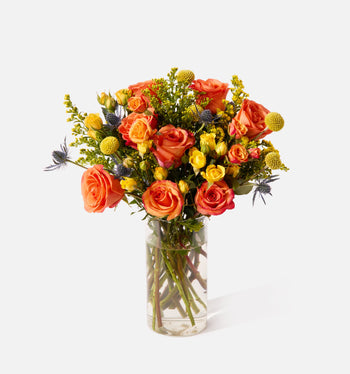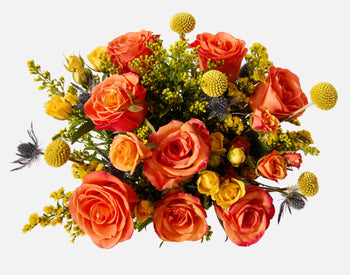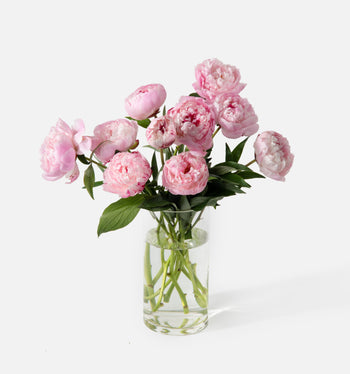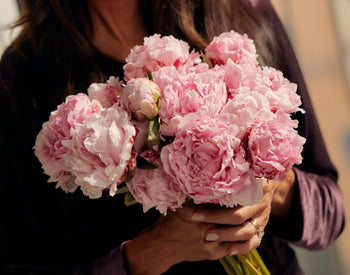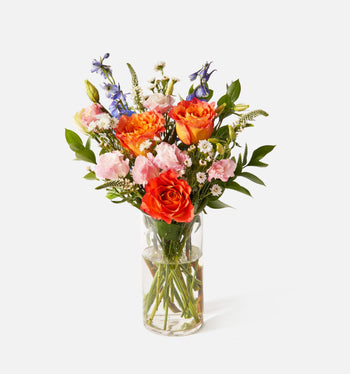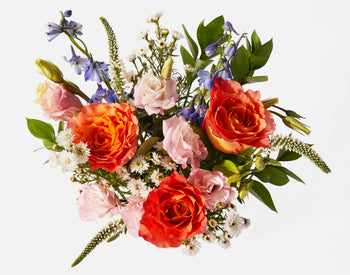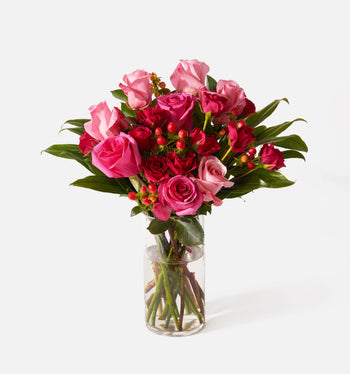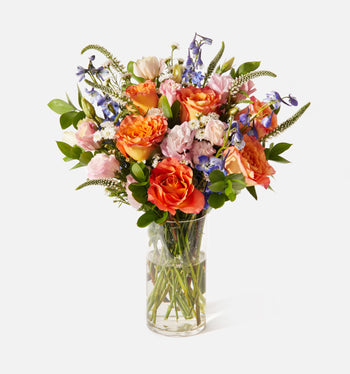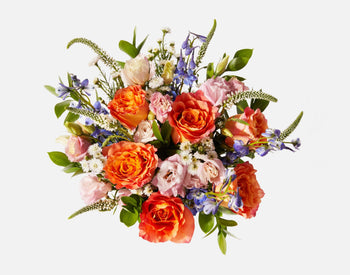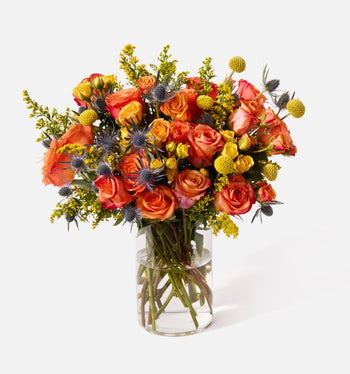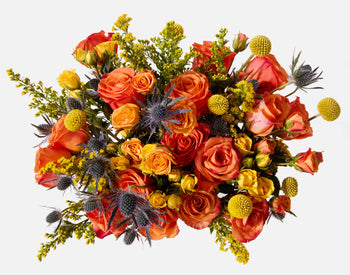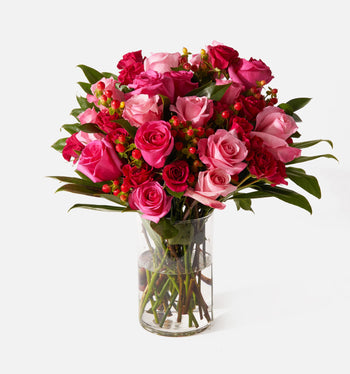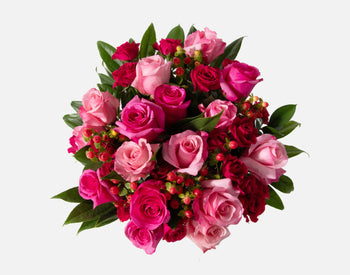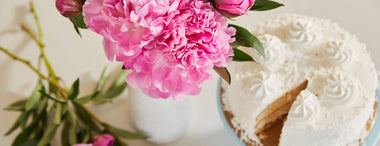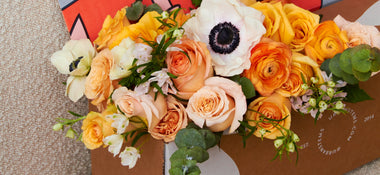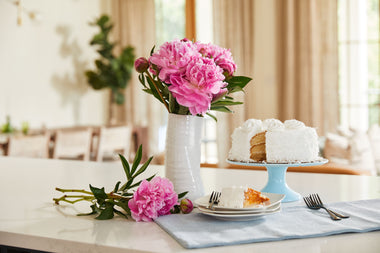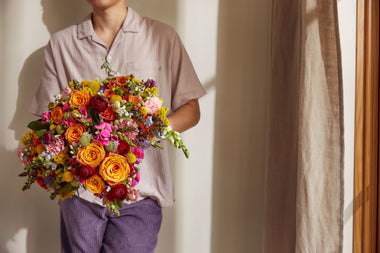There’s no way to start this post other than to say, I AM SO EXCITED to be able to bring Vanda Orchids to you this fall. They’re a fabulous but rare stem that I have been hoping to bring into our collections for as long as I’ve worked with UrbanStems. Beginning this September, we’ll finally be featuring these beauties in The Exotic Orchid, an UrbanStems exclusive arrangement (I promise, you won’t find these from any other online flower company). And, lucky you, I’m here to tell you everything there is to know about this stunning design.
First thing’s first, look at the showpiece of this arrangement – 2 full stems of “yellow henna” Vanda Orchids. Typically, when you see these flowers in a mixed arrangement, they’re single blossoms. What designers do is cut an individual flower from the larger stem, stick it into a water tube to keep it fresh, and then tuck the tube into some greenery or a fluffy stem like hydrangea to hide it. We, on the other hand, are giving 2 full stems of these stunners along with a mix of supportive greenery to lift and show them off. Plus, we include a sleek, neutral vessel so no one has to worry about finding the perfect vase for their Vandas. Now, I hear you asking - what is so special about these orchids? Why SHOULD I care that I get 2 stems of them? Let’s get into it.

These orchids are rare! Orchids of all kinds (including Phalaenopsis Orchids, which are probably more familar) are epiphytes by nature. This means that they grow in the branches of trees or on other tall natural structures. Some species, like the Phals, can be potted and sold like other plants, which is why you can find them at the supermarket. Vandas are too delicate to be potted and shuffled around that way. They prefer to have their roots bare and exposed so that they can draw water and nutrients from the air itself. Trying to pot them would just kill them. For our farmers, this means they grow their vandas hanging in long rows from the ceilings of greenhouses. Each day, farmers carefully check the growing plants, misting them or applying agricultural products to ensure healthy development. Once they’re ready to harvest, the bloom is carefully removed and the plant goes back to its spot in the greenhouse to keep on growing. Each plant typically only produces 2-3 flowering stems per year. Compare that to a rose crop, which could produce 50 or more viable stems per harvest. There simply aren’t as many Vandas in the world as there are other types of stems!

Our Vandas are well traveled (and they fly first class)! You already know that we travel around the world to find you the most exquisite stems that we possibly can, whether it’s peonies from New Zealand, Roses from the Andes Mountains, or Tulips from Holland. These Vandas are no exception! They can only be grown in tropical climates (like Hawaii or Southeast Asia), so we work closely with our partners to ensure they travel safely to the United States. Each blossom will be painstakingly harvested, and wrapped gently in cotton before being sealed into a temperature controlled box for travel. Because so much work goes into creating these special stems, it’s not an overstatement to say that they’re incredibly special. Typically, they’re very expensive when you find them in a flower shop, if they’re carried at all, and you will never see a Vanda Orchid at your local market.
Orchids are long lasting! Fresh cut orchids (like all tropical flowers) tend to have an amazing vase life with proper care. You know the care drill - fresh water and a stem trim every 2 days or so. When we were developing this bouquet, one of my amazing colleagues reached out to let me know that his orchids had lasted more than 2 weeks! If you have ever worked with flowers before, you’ll know that this is wild. Most bouquets will last 5-7 days depending on the component stems and their environment. Even with ideal care, roses and other stems will top out at about 10 days of vase life, and these orchids will absolutely outperform that if you’re a good flower mom.
I’m going to tell you exactly how to arrange them! Here is a stem by stem breakdown of how to make the most out of The Exotic Orchid:
- Remove the bouquet and vase from their packaging and lay the bouquet aside. This bouquet has a clear front and back, but just in case it needs to be said - do not lay the bouquet orchid side down.
- In general, handle the orchids gently. Don’t let yourself get paralyzed with fear, but these babies are worth protecting.
- Fill your vase with a cool mixture of water and flower food (mixing instructions will be on the back of the flower food sachet - usually it’s 1 sachet to 1 liter of water).
- Now, remove all the rubber bands and bindings from your bouquet because we’re going to go stem by stem here.
- First, trim and place the eucalyptus into the vase (this is the silver green foliage with smaller leaves). You’ll want to leave these stems a touch longer, so that they drape out of the vase – think 3-4” taller than the vase itself.
- Then, add your 3 big Aralia (Fatsia) leaves. They’re the broad green leaves. Try to position them on either side of the vase so that they can support the heavier orchids.
- Then add your stems of Leucadendron (the maroon foliage). I like them between the existing foliage stems sitting about 4” taller than the top of the vase. They add fun directional drama.
- Now come the orchids! First, remove the tubes. Those are for travel only, so please remove them and then trim your orchid stems about ¼”. Once you’ve trimmed, place them into the vase among the other greens. You should have enough of a grid to support them now. Note: You may need to snip 1-2 of the lower flowers off of each Vanda stem to get them to sit nicely together. Don’t panic about this, just float the removed flowers in a low bowl of water to enjoy them another way. No big swig!
- Finally, trim and tuck your berries between the stems in the vase to add some fun texture. For this bouquet, I like my hypercium berries closer in height to my eucalyptus.

So there you have it! When I first wanted to bring these orchids into our collection, several of my colleagues expressed their (well founded) doubts – the orchids are too delicate, or people might not understand them – you get it. But, through some testing and some amazing collaboration, we built a bouquet that we feel proud to stand behind AND it features a rare and exclusive variety of orchids that’s flown across the world just to grace your table. What’s not to love?


